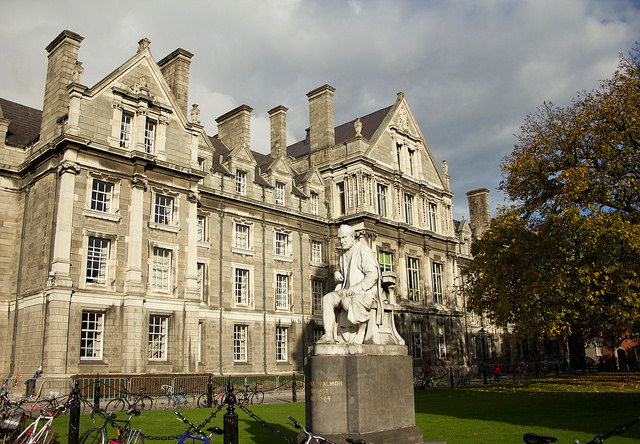
Since its inception in 1904, the Elizabethan Society (the Eliz) has provided a space solely for women’s voices, acting as the female counterpart of the University Philosophical Society (the Phil). In 1981, the two societies merged – but the Eliz continues to provide a platform for women within the society. Last night’s inaugural approximately marks four years since the Eliz’s resurgence to Trinity thanks to its now president Sheila Naughton, providing an evening which celebrated women in performance. This topic has ferociously come to the fore since the dawn of the Waking The Feminists movement at the end of 2015. Lian Bell, campaign director of Waking the Feminists, was one last night’s guest speakers, and eloquently set the tone for the evening by discussing the ripple effect in Irish theatre that the Waking the Feminists movement had created, in terms of questioning and consequently working towards a re-establishment of the industry’s attitudes and placement of women’s roles in theatre.
The audience also held the privilege of hearing the personal opinions and experiences of six brilliantly talented, courageous, and downright admirably sassy female artists who described their journey and achievements in a predominantly male-driven environment, while also discussing what inspires them to keep actively engaging in their field of work despite the challenges they face as women.
First to take the stage was former journalist, scriptwriter, broadcaster, and now playwright Fiona Looney (credits including Dandelions, and October) who took us back in time to the 1800s to pay homage to the life of Anglo-Irish actress Dora Jordan and her absence in the archives of Irish and British history. The frustration behind this removal of Mrs Jordan’s flamingly successful acting career spurred Looney on to discuss her dealings with the unfortunate inevitability of conforming to the feminine ideal early on in her career as a writer. Anything that didn’t fit the form of chick-lit and “baby-lit”, when she became pregnant, was reluctantly, and if not at all taken on board by her male and even female colleagues. This was especially the case when she first attempted to try her hand at comedy writing. She was met frequently with the “women aren’t funny” retort, or more back-handedly asked repeatedly what it was like to work as a female comedian, a question every guest speaker has become all too familiar with. Through her speech, Looney highlighted the need for change in our society towards women in performance, stating: “Who are the two most famous women in Ireland today? Mrs Brown and Panti Bliss.”
Joanne McNally (credits include Separated at Birth, and Bite Me for which she received the nomination of Best Performer in the Dublin Fringe Festival) reiterated this point by commenting on the unwritten rules that she felt women had to comply to whilst performing in stand up: the need to apologise and self-deprecate, to not appear too “sexy” while constantly being on the defence. However, when asked if she ever personally felt the need to give in to these rules, McNally bluntly responded with a single word: “No.” It is this honesty and bluntness that permeates throughout McNally’s work. She then openly spoke about how her struggle with an eating disorder gave her the material for her show Bite Me, which depicts the conversation McNally has with her illness where it is personified as Louis Walsh.
Similarly, actor, writer, and director Beth Vyse (Spooks, A Touch of Frost, Holby City) treated the crowd to an extract of her comedy performance “As Funny as Cancer”, in which she told the story of her cancer diagnosis and treatment in a way that moved all present. With anecdotes smattered with her Stoke-on Trent charm, the performance also had us belly laughing, with anecdotes of being spotted by Nelson Mandela and giving Michael Jackson her phone number.
Former Trinity Drama graduate and Player’s alumni Lian Bell, world-famous casting director Maureen Hughes, and actor, now turned novelist, Kate Thompson also demonstrated that acknowledging the obstruction sexism causes in the arts industry is the first step in bridging the severe gap that has created this idea of the female space versus the male space.
Overall, the Eliz inaugural delivered a truly inspiring evening, with all of the guests providing an atmosphere of positivity for female artists that highly resonated with the audience of majority drama students, many of whom wish to follow in the paths that these six speakers have paved so humbly and graciously. The speakers demonstrated just what can be achieved when one uses self-belief and self-empowerment as a tool for creating change in an industry, and also in a society that is quick to judge women who speak freely. But as Beth Vyse so fervently urged us all: ‘‘If you have something to say, say it.”
Preach sister. I’m with you all the way.






